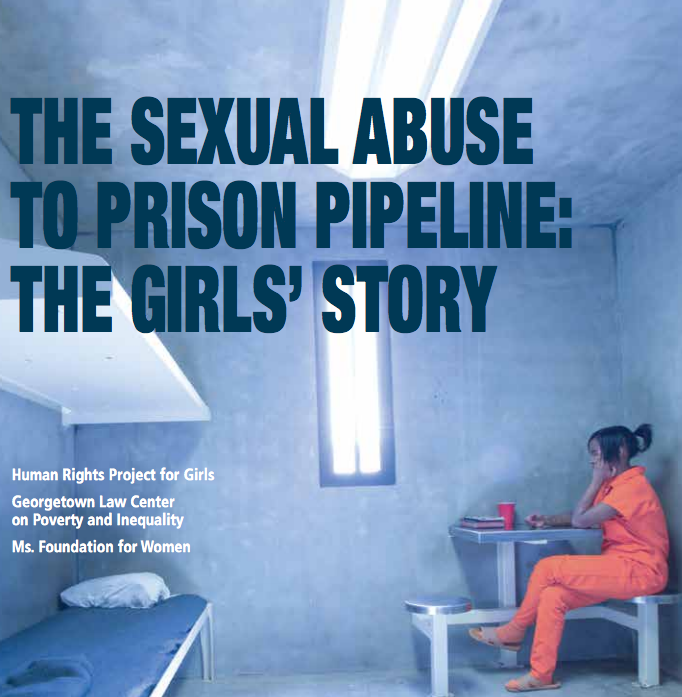Behind the report “The sexual abuse to Prison Pipeline: The Girls’ Story”
Anne-Lise Vray, CFYJ Intern

Forced into child sex trafficking at the age 13, Kyeisha got pulled into the juvenile justice system while trying to escape her abusive home. Kyeisha, now an 18 year-old juvenile justice advocate, was one of the members of today’s discussion panel on the just-released report “The Sexual Abuse to Prison Pipeline: The Girls’ Story”. This powerful document was published by the Georgetown Law Center for Poverty and Equality, in collaboration with the Human Rights Project for Girls and the Ms. Foundation for Women, and highlights how sexual abuse on girls is often a trigger leading them directly to jail. Indeed, the report reveals for example that 93% of Oregon and 81% of California girls in the juvenile justice system have been sexually or physically abused. Overall across the country, 39% of girls who get pulled into the juvenile justice system have been raped or sexually assaulted.
To raise awareness on these unbelievably true statistics, Congresswoman Karen Bass organized a panel discussion on the report. Along with the document’s authors, the panel included several sexual abuse victims and juvenile justice survivors who courageously shared their stories. Among them, Charity Chandler-Cole, who is now working as an advocate for the Anti-Recidivism Coalition, told the audience how, when she got arrested for the first time for stealing underwear because her mom could not afford to buy some for her and her siblings, the system actually deepened and worsened her trauma. Indeed after her arrest, Charity was sent to jail where she was sexually abused. In tears, she explained to the audience that she somehow found the inner strength to keep fighting to show the world she was worth it, but that many girls in her situation cannot hang on to anything, and that we need to be here for these traumatized children, who are victims more than offenders.
The panel also emphasized the harder struggle young women of color are facing, especially African-American girls, who even though they only represent 14% of the total U.S youth population, make up 33% of the kids in the juvenile justice system.
“Girls are ultimately being criminalized because they are abused”, said Rebecca Epstein, member of the panel and report’s co-author. Indeed, many young girls are sent to jail every year for prostitution, while they were actually being sexually exploited. In fact, although it is illegal to have sex with a minor, by some kind of legal mechanism it is possible to charge a child, who is in reality a victim of sexual trafficking, with prostitution.
Unanimously, the report and the panel recommended and urged reauthorization of the JJDPA (Juvenile Justice and Delinquency Prevention Act) , strengthening of the PREA (Prison Rape Elimination Act), and overall a more comprehensive and specific approach for young girls in the juvenile justice system. This involves implementing around them a solid structure of support which understands that these kids’ backgrounds and traumas are directly related to their actions and behaviors. It also implies that we stop sending them automatically to jail, especially those who commit status offenses (i.e. age-related offenses like underage drinking or skipping school), but instead understand the causes of these offenses and provide a safe environment for them, since their home is often not one.

